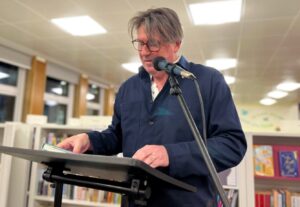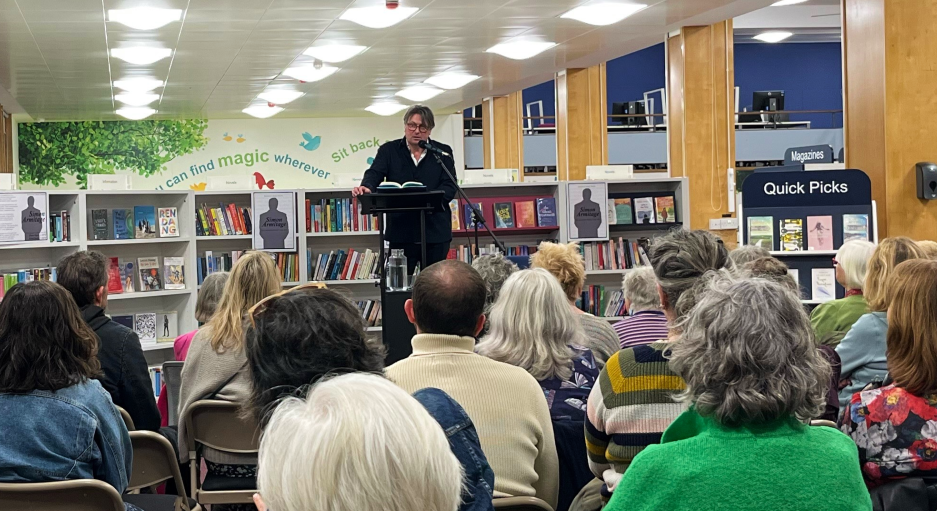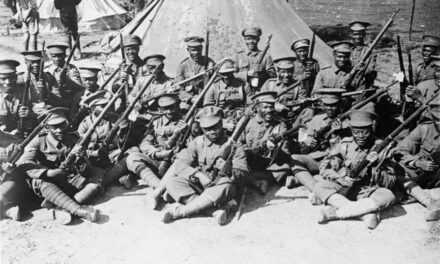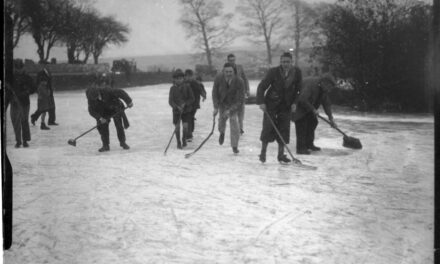Written by Elaine Weddle.
On National Poet’s Day, Simon Armitage, Poet Laureate, came to Eastbourne on the latest leg of a UK tour and described the pleasure of visiting his village library and how he now hopes to put something back …
It’s not every day that the Poet Laureate drops into Eastbourne library. On his first visit to the town, the softly spoken Yorkshireman is determined to get a glimpse of the sea despite the drizzle and dark of a March evening “I’m a landlubber,” he explained.
Armitage is an award-winning poet, professor, author, songwriter, playwright, musician, translator and in the last few years an accomplished interviewer of guests, such as JK Rowling, Jo Whiley and the then Prince of Wales in his own Radio 4 series, The Poet Laureate has Gone to his Shed.
E is for Eastbourne

Poet Laureate, Simon Armitage at Eastbourne Library.
He accepted the Laureateship in 2019, a ten-year role, but, as he’s quick to point out, there’s no requirement to do anything at all. His tenure was interrupted, as it was so for many others, by a certain virus, but he’s back now making eight or ten visits to libraries each spring, using the alphabet as a compass, travelling to big cities and remote communities.
“I think there’s a tendency among some people to think of libraries as simply a place where books are borrowed and returned, and my feeling is that they are very much more than that. I mean they’re that as well, but I think especially for kids the idea of coming into an emporium that is full of books that you can take away is still quite a magical experience,” he said.
National treasure
Armitage’s smart and witty words about British life, and more often life in the north, has made him a national treasure. The tour is booked out. He treats the Eastbourne audience, sitting in the freshly-painted, high-ceilinged room, to a selection of pieces, including his latest work, Never Good with Horses, and reflects on the difficulties of the last few years. Finding himself trapped like millions of others within his own four walls, he found himself writing three poems about the window in the roof above his desk.
“We spend too much time in our own cells these days, it’s too easy to live your life from the settee. I think it’s vital we experience other people and learn how to be around them, and I think you can do that in a library. They occupy a really important place in a lot of communities – venues for events, for comings together, for happenings and its where people meet and learn how to behave and acknowledge each other. Libraries are now so welcoming, not hush, hush.”
Libraries a “real lifeline”
A probation officer for eight years in Manchester, Armitage also understands the daily struggle so many people experience: “Libraries are a real lifeline, you can get access to the internet and we all need that now it’s a utility. We sometimes forget how expensive it is to be connected-up with phones and subscriptions and everything else.”
His love affair with libraries began in the village he grew up in, Marsden, West Yorkshire, at a library in the Mechanics’ Institute. “I remember the little kids’ area and the tiny seat you could pull up next to the shelves. It was strange to know that you could just take a book. I liked folk and adventure stories, magic and mystery. The first poem I wrote as a child was at school about Christmas and it didn’t get chosen as one of the best in class.”
During his time in the prison service, his writing improved “I got better at it, I found it [poetry] compelling and engaging. It was a way of having close contact with the world, describing how the world looks to me through a medium, a way of expressing myself.”
Just read
Today, his many roles include Professor of Poetry at the University of Leeds, his advice to students and would-be writers is simple “The trick is to read. You can’t be a writer unless you’re a reader, it’s like trying to make a fish without knowing what one was.
He concludes: “I’m just supporting the library as a great institution; it’s been under the cosh for quite a few years. The Laureateship is an opportunity, a mouthpiece, I want to speak up for libraries. It was the birthplace of my reading and therefore my writing I feel as if I want to put something back.”




